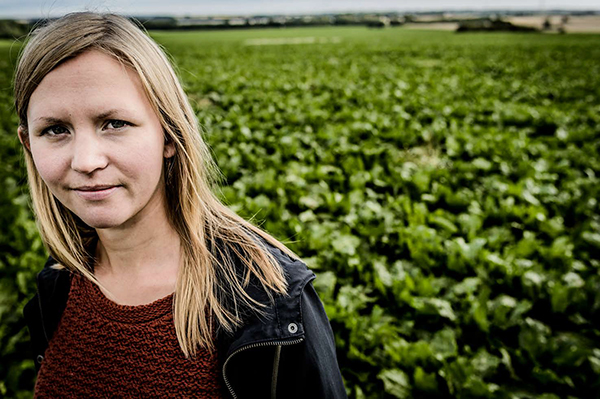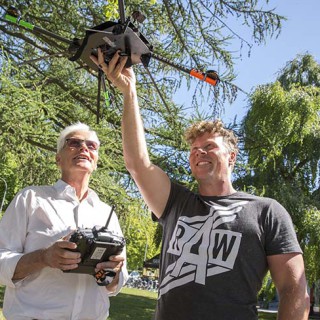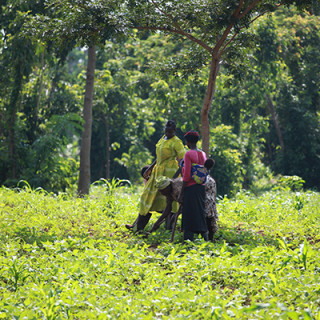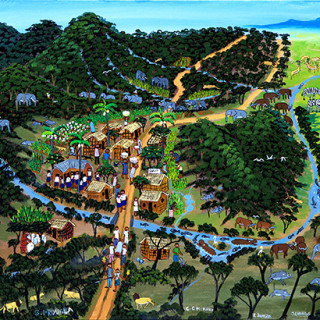What is modern agriculture in Africa? – Five questions for Ellinor Isgren
African countries are showing an increased interest to invest in agriculture. Many welcome this development, but there are also those who warn that conventional modernised agriculture is likely to disadvantage both the vast majority of smallholder farmers and the environment. Sustainability researcher Ellinor Isgren is investigating so-called agroecological farming and its potential as an alternative approach in Uganda
The government of Uganda has emphasised the need for investments in agriculture and started to make policy changes. How would you describe the predominant view on agricultural modernisation in this context?
The government mainly wants to see commercialisation, that is, that farmers produce more for the market. Therefore, they want to increase the use of modern inputs and technologies, such as fertilisers, pesticides, processed seeds, mechanisation and irrigation, by improving the farmers’ access to such technology and knowledge about it. There is a strong belief that this will reduce poverty and boost the economy, so that people can eventually leave agriculture. The biggest problem is perhaps that even if poverty reduction is described as the main purpose, these measures do not appear to benefit the poorest farmers. Instead, it seems that the main beneficiaries are those who can most easily assimilate new technology and thus achieve results.
Can we already see the effects of the implemented policy changes?
Despite the often powerful political rhetoric, farming is still only a small part of the budget in Uganda. The agricultural effects are considerably less apparent in practice than on paper. Something that may have an impact is the reinstatement of the National Agricultural Advisory Services, after having been shut down due to corruption. The focus of the advisory services is to distribute modern inputs and to get farmers to use them. Another example is the changing perception of land ownership, where the trend is to encourage a transition to private, individual ownership as the belief is that farmers will then be able, and want, to invest more in agriculture. Moreover, the government is trying to make Ugandan land more attractive to foreign investors, as they can provide modern technology and create jobs. However, the effect this has on the local population is highly debated in Uganda, as in many other countries.
So what is agroecology and in what ways does it challenge conventional agricultural modernisation?
Agroecological farming stems from research on how ecological processes can be utilised to create agricultural systems with high productivity, high diversity and low use of non-renewable resources. In practical terms, this includes mixing crops, combining animal and plant production, creating “integrated” pest management systems and closing the nutrient cycle. It also stresses that agriculture must be adapted to local conditions, both environmentally and socially, which goes against the belief in universal technological solutions, and questions the dividing line between people and nature. Chemical pesticides and fertilisers are not necessarily banned but are rather seen as shortcuts or emergency solutions, which are not sustainable in the long term. Some perceive agroecology as retrogressive and such criticism may be warranted, but for most people, both old and new technologies can be part of the solution.
There are of course many examples of locally adapted and sustainable farming practices, but isn’t one of the challenges to disseminate them to new users and places? How do advocates of agroecology in Uganda influence agricultural policies and concrete modernisation programmes?
Unlike in Latin America, where agroecological farming has had some political impact through social movements and networks led by smallholder farmers, agroecology in Uganda is at present mainly applied by individual stakeholders. Above all, the work here is about spreading knowledge about agroecological farming practices and encouraging farmers to cooperate to share knowledge and make joint investments. The inadequate support from the government has generated increased political ambitions – there are discussions on how to support farmers to demand more, and how civil society organisations can work together to increase their influence. Controversial issues such as GMOs, land investments and the use of chemicals also generate increased political activity.
What do you think about the future for Ugandan agriculture and in what way do you hope to contribute with your research?
It is very difficult to predict what will happen in Uganda because it is not just about what is “best” scientifically, but also about the economic and political interests that are integrated in agricultural development. In my research, I critically examine how the concept of agroecology is applied, by whom, and what challenges the advocates face in Uganda specifically. I find it interesting that despite major disagreements, there is also harmony between agroecology and the government’s aspirations in theory. The farmers and organisations that I have talked to emphasise the potential that agroecology has for a different type of agricultural intensification and commercialisation, which would also benefit the poorest segments of society. If we were to steer the debate more towards this without losing the environmental aspects, I believe that agroecology would have a greater impact.
Text: Elina Andersson
Photo. Kennet Ruona
Ellinor Isgren is a doctoral student in Sustainability Studies at LUCSUS (Lund University Centre for Sustainability Studies).







